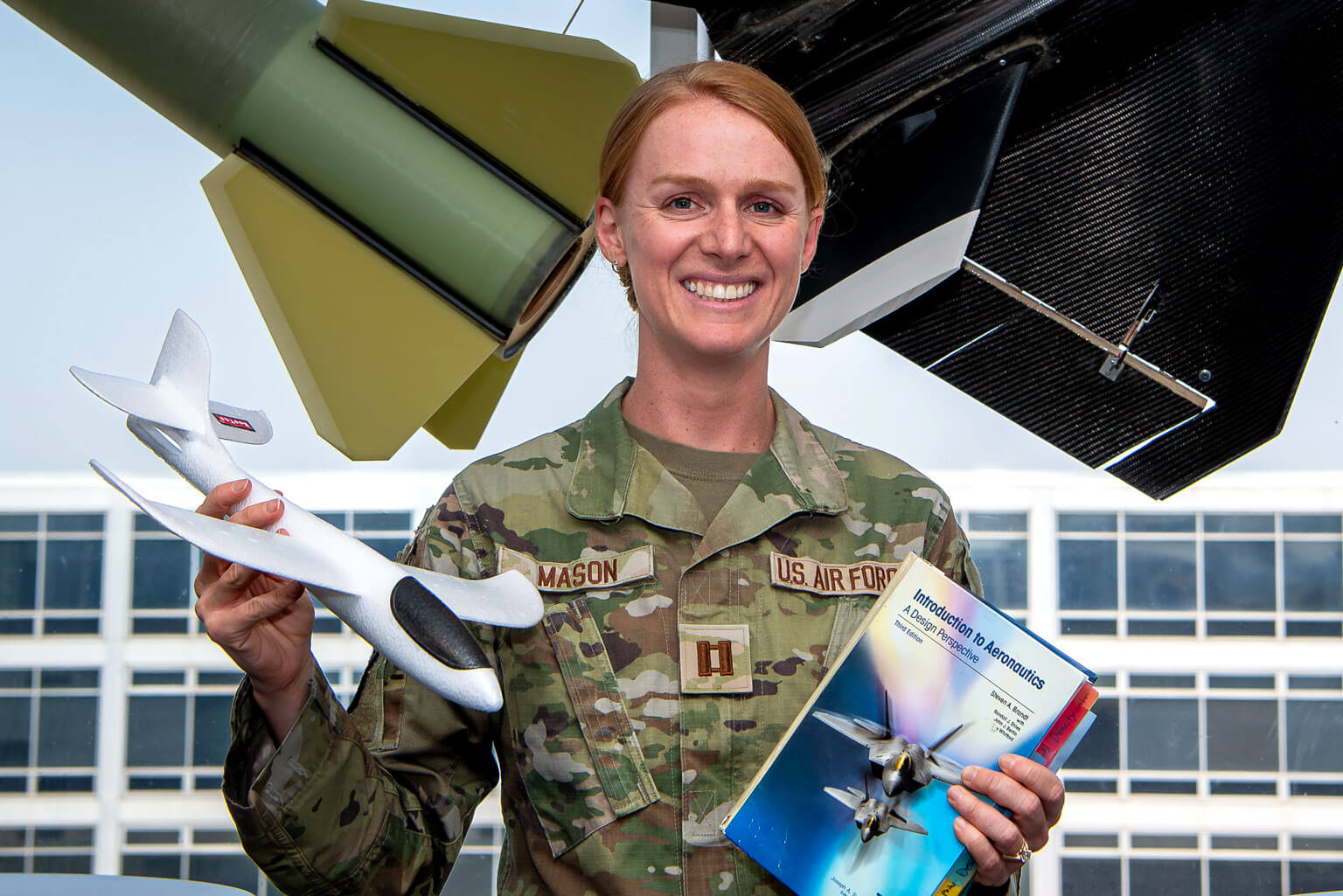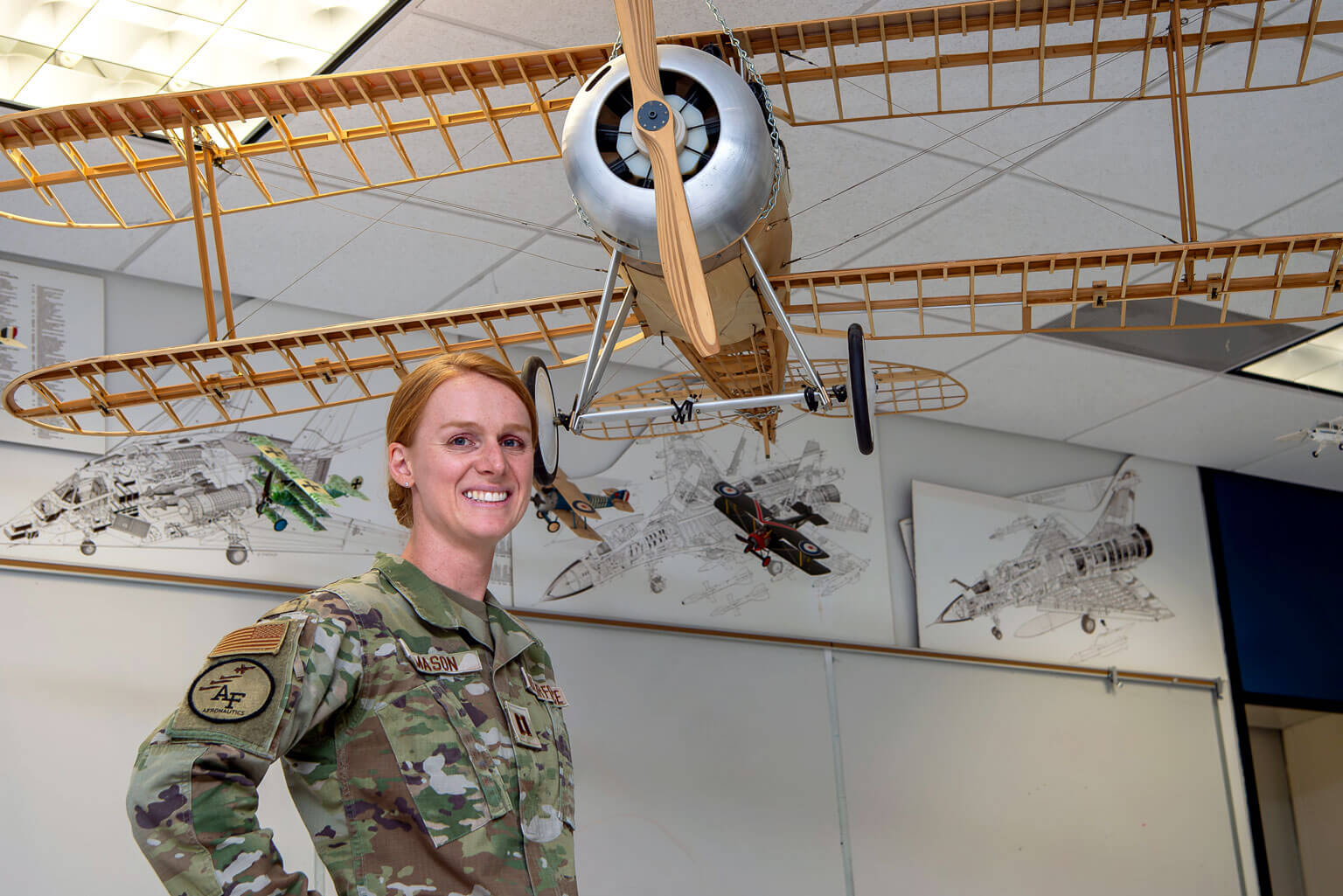Class of ’18 grad returns to Academy as aeronautics instructor

Capt. Anna Mason, U.S. Air Force Academy aeronautics instructor, poses for a photo July 24, 2024 at Fairchild Hall, the Academy, Colorado. (U.S. Air Force photo by Justin Pacheco)
By Katherine Spessa
U.S. Air Force Academy Strategic Communications
U.S. AIR FORCE ACADEMY, Colo. – Capt. Anna Mason, an aeronautical engineer and aeronautics instructor, sits in an office on the top floor of Fairchild Hall, deep in a maze of conference rooms and faculty offices.
As with many engineers, she likes to have something to do with her hands – she is spinning a propeller blade with increasing speed as she speaks passionately about her subject and about something she has become equally passionate about – teaching cadets.
The propeller blade is one training aid among many decorating her office, where model airplanes abound. Directly behind her is a handwritten note from her nephew saying she “makes the best paper airplanes.”
“I’m loving my time here; this really is buckets of fun,” Mason said. “It’s so easy to stay motivated because you see the impact immediately. You see the lightbulb go off in the cadets’ heads, and then you see them go off and do extraordinary things.”
Graduate-turned-instructor
This is Mason’s second time here, as she was recently one of those same cadets being inspired in the classroom. Mason was a Class of ‘18 graduate selected for the Graduate Studies Program Pipeline. This program tags one or two senior cadets each year who show promise as instructors to come back to the Academy to teach following a graduate degree program and an operational assignment.
Mason attended the Air Force Institute of Technology at Wright-Patterson Air Force Base, Ohio, followed by an assignment to the National Air and Space Intelligence Center. She returned to the U.S. Air Force Academy last year to begin her teaching assignment.
She was immediately placed in an introductory aeronautics course for those interested in pursuing an aeronautics degree, a course previously assigned to veteran instructors, but Lt. Col. Dell Olmstead, the Aeronautics Department deputy head, said Mason more than rose to the occasion.
“She is incredibly effective at getting them excited, engaged and asking deeper questions,” said Olmstead.

Capt. Anna Mason, U.S. Air Force Academy aeronautics instructor, poses for a photo July 24, 2024, in her classroom at Fairchild Hall, the Academy, Colorado. (U.S. Air Force photo by Justin Pacheco)
Aiding institutional change
In Mason’s graduating year, there were only 58 aeronautics majors, and she was one of only four women among them. The Class of ‘24 saw 126 aeronautics majors. Aeronautics is now the second-largest major at the Academy. Eighty-four percent of aeronautics majors will go on to become pilots.
Olmstead credits this largely to the culture of the Aeronautics Department and the accessibility of its instructors and professors, something Mason has readily adopted and expanded upon.
“We see this in her course feedback over and over again—the cadets feel like she understands why they don’t understand something, and she’s more than willing to meet them where they are,” said Olmstead. “Relatability and accessibility are something that Anna is uniquely effective at and what helps the Aero Department be so successful.”
Mason went from sitting in a classroom seat to standing at the front of one, bringing a unique and still relevant perspective to her department.
“One of the great things about bringing in former students is that we get a great deal of our best practices from them,” said Olmstead. “There are things they might be willing to tell you as a peer that they weren’t willing to tell you as a cadet. We need to hear it so we can keep getting better.”
Mentoring in and out of the classroom
Another value of the GSP is bringing back junior captains as mentors who remember what Academy life is like, both academically and personally, and the huge adjustment it can be for cadets leaving their family’s home for the first time and entering a completely foreign environment.
Academically, Mason is a huge proponent of office hours, setting aside large swathes of time for cadets who may have questions about the work or need help cementing their knowledge before moving on to the next topic.
“I want cadets to be okay with trying things out, to be honest about how ‘you lost me on lesson three,’” said Mason. “Great, I can catch you up. That’s part of the learning process, and that’s okay.”
She said that these discussions are a great chance to get to know cadets better and that their conversations often turn to how the cadets are doing and how they’re adjusting to their time at the Academy.
“I love that. Let’s talk through life, let’s talk through what’s going on,” said Mason. “I like helping them build personal resilience and how they can be empathetic leaders in their own time.
“Mentorship is one of the main reasons I was excited to come back. I had such great mentors in my time and it was such a huge blessing. Remembering the impact they made on my life, I’m really excited to pass that forward.”